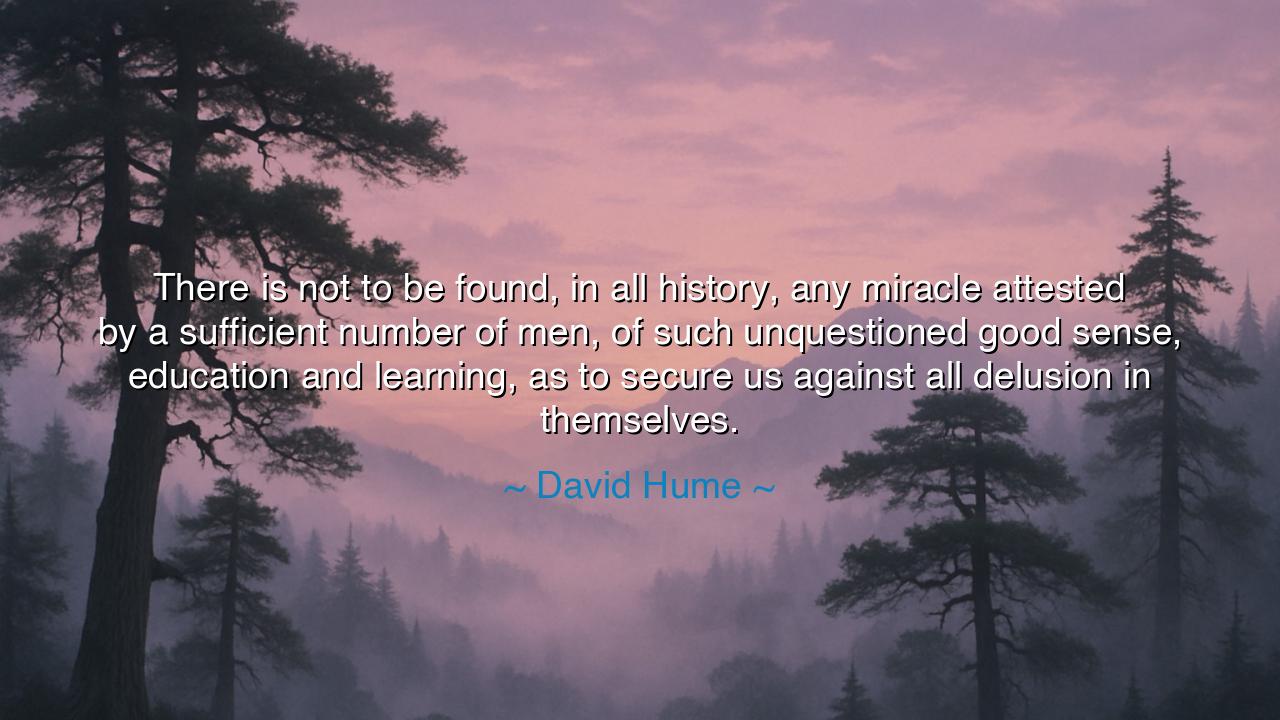
There is not to be found, in all history, any miracle attested by
There is not to be found, in all history, any miracle attested by a sufficient number of men, of such unquestioned good sense, education and learning, as to secure us against all delusion in themselves.






“There is not to be found, in all history, any miracle attested by a sufficient number of men, of such unquestioned good sense, education, and learning, as to secure us against all delusion in themselves.” — David Hume
In this powerful reflection, David Hume, the philosopher of reason and the patient observer of human nature, speaks as one who has stared into the heart of belief and sought the light of truth. His words are a call to the mind — a reminder that wisdom must not yield to wonder too easily, and that even the most marvelous tales must be weighed upon the scales of reason. Hume lived in an age when men claimed the heavens themselves had torn open to perform miracles, and yet he, with calm courage, questioned whether such wonders had ever been proven by those of unimpeachable judgment. His insight pierces like a blade through centuries of myth and superstition: that truth requires not passion, but discernment, and that the human heart, so easily moved by awe, must learn to temper belief with understanding.
To the ancients, miracles were the language of the gods — flames that defied nature, voices from clouds, healings by divine touch. Yet Hume reminds us that the measure of truth is not in the tale itself but in the testimony that supports it. A miracle, he tells us, must be attested by minds of good sense, by witnesses of learning, who are free from delusion or deceit. But such witnesses, he declares, are nowhere to be found in history. Thus, his message is not one of cynicism, but of caution. He does not seek to rob the world of wonder, but to purify it — to teach that true reverence for the divine is not born from blind faith, but from the honest pursuit of what is real.
Consider, then, the story of Galileo Galilei, who in his time stood accused of heresy for daring to proclaim that the Earth moved around the sun. The world clung to its miracle — the belief that the heavens revolved around man, a conviction sanctified by tradition and emotion. Yet Galileo, armed with reason and the evidence of his telescope, shattered that illusion. His courage was not in rejecting the divine, but in defending the truth against the comfort of delusion. Like Hume after him, he taught that belief untested by inquiry becomes idolatry — that the mind must remain awake, even when the heart trembles before mystery.
Hume’s skepticism is not the coldness of disbelief; it is the discipline of a mind that loves truth too much to accept it cheaply. To him, the world’s beauty lay not in false marvels, but in the infinite complexity of nature itself. The real miracle, he would say, is not that water turns to wine, but that water exists — that the laws of the universe are so ordered and profound that they sustain life, thought, and love. In this, he is closer to the mystics than to the cynics: for he teaches that awe, when guided by reason, becomes enlightenment; but awe untempered by reason becomes delusion.
The lesson of this quote reaches far beyond philosophy; it speaks to every seeker of truth in every age. We live in a world where rumors spread faster than reason, where belief often outpaces understanding. Hume’s words remind us to pause, to question, to look for the sufficient number of wise witnesses before giving our trust. To be rational is not to be joyless; it is to build one’s faith on firm ground rather than shifting sand. The ancients taught that “the unexamined life is not worth living” — Hume extends that wisdom: “the unexamined belief is not worth holding.”
Thus, dear listener, let this teaching settle in your heart. Do not reject wonder, but test it. Do not mock faith, but refine it. When you hear of miracles — of claims beyond the reach of sense — seek not the comfort of immediate belief, but the clarity of evidence and the purity of reason. Let your mind be both teacher and guardian, your heart both student and dreamer. For in balancing these two — skepticism and wonder — lies the highest form of wisdom. And when truth at last stands revealed, you shall see that reality itself, governed by law and mystery alike, is the greatest miracle of all.






AAdministratorAdministrator
Welcome, honored guests. Please leave a comment, we will respond soon